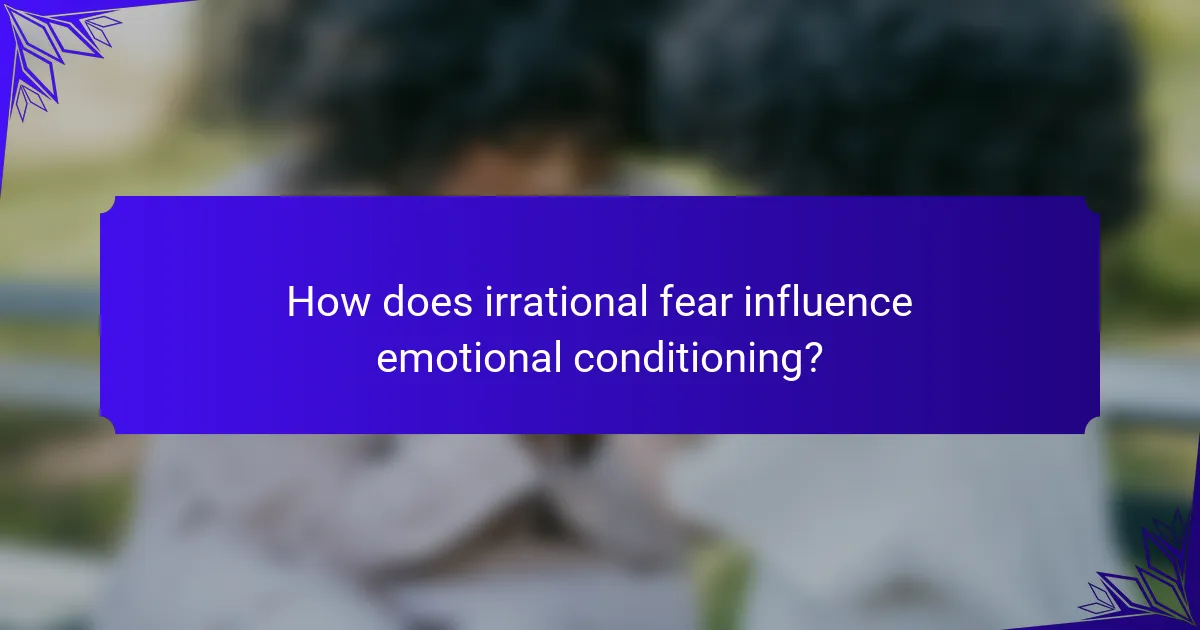Irrational fear can significantly hinder personal development, learning, and emotional growth. This article explores its definition, common attributes, impact on behavior, and emotional conditioning. It also discusses effective coping strategies and therapeutic interventions. Understanding irrational fear is essential for overcoming its debilitating effects.

What is the meaning of irrational fear?
Irrational fear refers to an intense, persistent fear of a specific object or situation that is disproportionate to the actual threat. This type of fear significantly impacts learning, behavior, and emotional conditioning. It can hinder personal development, as individuals may avoid situations that provoke this fear, leading to missed opportunities. Understanding irrational fear is crucial for developing effective coping strategies and therapeutic interventions.
How does irrational fear differ from rational fear?
Irrational fear is an emotional response lacking a rational basis, while rational fear is grounded in real threats. The impact of irrational fear on learning and behavior can hinder decision-making and emotional conditioning. For instance, irrational fears can lead to avoidance behaviors that limit personal growth. Rational fears, in contrast, promote caution and preparedness in the face of genuine danger. Understanding these differences is crucial for addressing emotional responses effectively.
What are the psychological roots of irrational fear?
Irrational fear often stems from psychological roots such as past trauma, learned behaviors, and cognitive distortions. These factors influence how individuals perceive threats, impacting their learning, behavior, and emotional conditioning.
Traumatic experiences can create lasting associations with fear, leading to heightened sensitivity to perceived dangers. Learned behaviors, often modeled from parents or peers, can reinforce irrational fears through observation and imitation. Cognitive distortions, such as catastrophizing or overgeneralization, further amplify these fears by skewing reality.
Understanding these roots is essential for addressing irrational fears effectively. Therapeutic approaches like cognitive-behavioral therapy can help individuals reframe their thoughts and reduce the impact of these fears on their daily lives.
What role does childhood experience play in developing irrational fears?
Childhood experiences significantly shape the development of irrational fears. Early interactions and environmental factors can create lasting emotional conditioning, leading to maladaptive responses. For example, a traumatic event may instill a fear that persists into adulthood. Research indicates that children exposed to anxiety-provoking situations are more likely to develop irrational fears later in life. Additionally, parental responses to fear can reinforce these irrational beliefs, making it crucial to understand the role of early experiences in emotional development.
How does culture influence perceptions of irrational fear?
Culture significantly shapes how individuals perceive irrational fears through social norms and values. For instance, cultural attitudes towards certain stimuli, like spiders or heights, can amplify or diminish fear responses. In collectivist cultures, fear may be influenced by community beliefs, while individualist cultures may emphasize personal coping strategies. Additionally, cultural narratives and media representations can normalize or stigmatize specific fears, affecting emotional conditioning. Understanding these cultural influences is crucial for addressing irrational fears effectively.

What are the universal attributes of irrational fear?
Irrational fears universally manifest as intense, disproportionate responses to specific stimuli. Common attributes include excessive anxiety, avoidance behavior, and physiological reactions. These fears can hinder learning and emotional development, impacting daily functioning. Understanding their root causes, such as past trauma or learned behaviors, is crucial for effective management.
How does irrational fear affect learning processes?
Irrational fear hinders learning by inducing anxiety, which disrupts cognitive functions. This fear can lead to avoidance behaviors, limiting exposure to new information. Additionally, it affects emotional conditioning, making it harder to engage with learning materials. Over time, these patterns can create a negative feedback loop, further diminishing learning potential.
What impact does irrational fear have on behavior?
Irrational fear significantly disrupts behavior by causing avoidance and anxiety. It can hinder learning, limit social interactions, and trigger emotional distress. This fear often leads to a cycle of negative reinforcement, where the individual avoids situations that provoke fear, thereby reinforcing the irrational belief. As a result, opportunities for growth and positive experiences are diminished. Understanding this impact is crucial for developing effective coping strategies and interventions.
How can irrational fear lead to avoidance behavior?
Irrational fear can lead to avoidance behavior by causing individuals to steer clear of situations that trigger their anxiety. This behavior reinforces the fear, creating a cycle that hinders learning and emotional growth. Over time, avoidance can limit experiences, resulting in increased isolation and distress. Understanding this dynamic is crucial for addressing irrational fears effectively.
What are common emotional responses associated with irrational fear?
Common emotional responses associated with irrational fear include anxiety, panic, and avoidance behavior. These reactions can significantly impact learning and behavior, often leading to a cycle of negative emotional conditioning. Anxiety manifests as a heightened state of worry, while panic can result in physical symptoms like rapid heartbeat. Avoidance behavior often leads to missed opportunities for growth and learning. Understanding these emotional responses is crucial for addressing irrational fears effectively.

What unique characteristics define irrational fear?
Irrational fear is characterized by its disproportionate response to perceived threats. This fear often lacks a rational basis, leading to avoidance behaviors that can hinder learning and emotional growth. Unique attributes include its persistence despite evidence to the contrary and its ability to trigger intense emotional responses. As a result, individuals may experience anxiety, panic attacks, or phobias that disrupt daily functioning. Understanding these characteristics is crucial for developing effective coping strategies and therapeutic interventions.
How can irrational fear manifest in different individuals?
Irrational fear can manifest in various ways depending on the individual’s experiences and personality traits. Common manifestations include avoidance behaviors, where individuals steer clear of situations triggering their fears. Some may experience physical symptoms like sweating or increased heart rate. Others might display anxiety or panic attacks when confronted with their fears. Cultural background and personal history significantly influence these responses, leading to unique expressions of irrational fear. Understanding these variations is crucial for effective coping strategies and therapeutic interventions.
What are the unique coping mechanisms for irrational fear?
Coping mechanisms for irrational fear include exposure therapy, cognitive restructuring, mindfulness practices, and deep breathing techniques. These strategies help individuals confront fears, reframe negative thoughts, and reduce anxiety.
Exposure therapy gradually exposes individuals to their fears, promoting desensitization. Cognitive restructuring challenges irrational beliefs, helping to shift perspectives. Mindfulness practices enhance awareness of the present moment, reducing fear responses. Deep breathing techniques activate the body’s relaxation response, alleviating immediate anxiety.
How does exposure therapy help in addressing irrational fears?
Exposure therapy effectively helps individuals confront and manage irrational fears by gradually exposing them to the feared object or situation. This process reduces anxiety and allows for the reconditioning of emotional responses. Research indicates that repeated exposure leads to desensitization, facilitating new learning experiences that counteract irrational beliefs. As a result, individuals can develop healthier coping mechanisms, ultimately improving their overall emotional well-being and behavior.
What role does cognitive behavioral therapy play in treatment?
Cognitive behavioral therapy (CBT) effectively addresses irrational fears by modifying thought patterns. This therapy helps individuals identify and challenge distorted beliefs, leading to improved emotional regulation and behavior. CBT techniques, such as exposure therapy, gradually desensitize individuals to their fears, fostering resilience. As a result, patients often experience reduced anxiety and enhanced coping strategies, positively impacting their learning and behavior.

What are the rare attributes of irrational fear?
Irrational fear can exhibit rare attributes such as extreme avoidance behavior, disproportionate emotional responses, and persistent anxiety despite lack of real threat. These characteristics can significantly hinder personal development and learning. Understanding these rare attributes provides insight into the profound impact irrational fears have on behavior and emotional conditioning.
How can irrational fear lead to unexpected learning outcomes?
Irrational fear can lead to unexpected learning outcomes by forcing individuals to confront challenges. This confrontation often results in resilience and adaptability. For instance, a student afraid of public speaking may develop effective communication skills through repeated exposure. Such experiences can enhance emotional conditioning, where fear transforms into a motivator for personal growth. Additionally, irrational fears can reveal underlying strengths, fostering a deeper understanding of oneself and improving problem-solving abilities.
What are some uncommon triggers for irrational fear?
Uncommon triggers for irrational fear can stem from unexpected stimuli. Examples include specific sounds, scents, or colors that evoke past trauma. Certain textures or sensations may also activate irrational fear responses. Moreover, abstract concepts, like numbers or patterns, can elicit anxiety in sensitive individuals. Understanding these triggers aids in addressing emotional conditioning and behavior patterns.

How does irrational fear influence emotional conditioning?
Irrational fear significantly influences emotional conditioning by creating maladaptive responses to stimuli. This fear can trigger heightened emotional reactions, leading to avoidance behaviors. As a result, individuals may develop conditioned responses that reinforce their fears over time. For example, someone with a fear of public speaking might experience anxiety at the mere thought of speaking, which can hinder their ability to learn and adapt in social situations. Understanding this connection is crucial for addressing irrational fears and improving emotional regulation.
What are the long-term effects of irrational fear on emotional health?
Irrational fear can lead to significant long-term effects on emotional health, including chronic anxiety and depression. Over time, it may distort perception of reality, impair decision-making, and hinder personal growth. Individuals may experience increased stress responses, leading to physical health issues. Furthermore, irrational fear can create avoidance behaviors, limiting social interactions and opportunities for positive experiences. This can reinforce negative thought patterns, perpetuating a cycle of fear and emotional distress.
How can irrational fear affect interpersonal relationships?
Irrational fear can significantly disrupt interpersonal relationships by fostering misunderstandings and emotional distance. Individuals may avoid social interactions or misinterpret others’ intentions, leading to conflict. As a result, communication breaks down, trust erodes, and relationships suffer. Addressing irrational fears through therapy or open dialogue can restore connection and improve relational dynamics.

What practical strategies can help manage irrational fear?
To manage irrational fear, practice gradual exposure, cognitive restructuring, mindfulness techniques, and seek professional support. These strategies help reframe thoughts, reduce anxiety, and improve emotional regulation. Gradual exposure involves facing fears incrementally, while cognitive restructuring challenges negative beliefs. Mindfulness techniques promote present-moment awareness, reducing the intensity of fear responses. Seeking professional support can provide tailored guidance and coping mechanisms.
What are the best practices for overcoming irrational fears?
To overcome irrational fears, practice gradual exposure, cognitive restructuring, mindfulness techniques, and seek professional support. These strategies help individuals confront fears, reframe negative thoughts, and develop healthier emotional responses. Gradual exposure allows for desensitization, while cognitive restructuring challenges irrational beliefs, promoting resilience. Mindfulness enhances self-awareness, reducing anxiety. Professional support can provide tailored guidance and accountability.
What common mistakes should be avoided when addressing irrational fear?
Avoiding common mistakes when addressing irrational fear involves recognizing and correcting specific behaviors. First, do not dismiss the fear as trivial; this invalidates feelings. Second, avoid using confrontational methods, as they can increase anxiety. Third, do not rush the process; gradual exposure is essential for effective management. Fourth, neglecting to seek professional help can hinder progress. Lastly, failing to practice self-compassion can exacerbate feelings of inadequacy. Addressing these mistakes can lead to more effective coping strategies and improved emotional conditioning.
How can mindfulness techniques be applied to reduce irrational fear?
Mindfulness techniques can effectively reduce irrational fear by promoting awareness and acceptance. These practices help individuals recognize their fears without judgment, allowing for emotional regulation and cognitive restructuring. Techniques such as focused breathing and meditation encourage a present-focused mindset, diminishing the power of irrational thoughts. As a result, individuals experience decreased anxiety and improved coping strategies. Regular practice can lead to long-term changes in behavior and emotional conditioning, ultimately fostering resilience against irrational fears.
What expert insights can guide individuals in managing irrational fear?
Expert insights for managing irrational fear include recognizing triggers, practicing mindfulness, and employing cognitive-behavioral techniques. Understanding the root causes of fear can foster emotional resilience. Gradual exposure to feared situations helps desensitize responses, while seeking professional guidance can provide tailored strategies. Engaging in supportive communities enhances coping mechanisms and reduces isolation.


